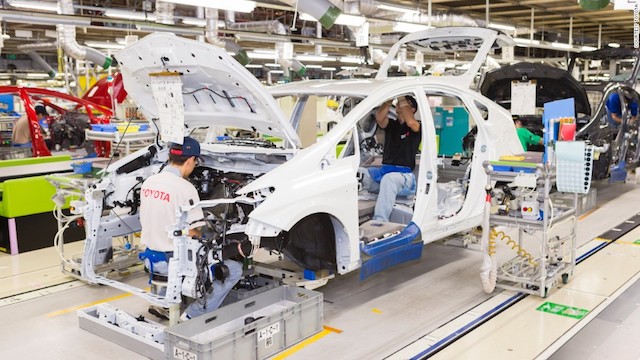 Despite excess capacity, Toyota rarely closes factories.
Despite excess capacity, Toyota rarely closes factories.
On April 1, 2010, the final Toyota Corolla rolled off the line at the NUMMI plant in Fremont, California—a joint venture between General Motors and Toyota. This marked the end of an era, as the facility had been a symbol of collaboration and innovation in the U.S. automotive industry. The decision came during a time of economic turmoil, when many automakers faced severe challenges, leading to mass layoffs and the demise of entire brands like Pontiac and Hummer.
NUMMI was one of the few plants that Toyota ever closed. Even when GM filed for bankruptcy and seemed poised to walk away, Toyota considered keeping the plant open to produce only Toyota vehicles. The company worked closely with the union to find a solution and ensured that workers received fair severance packages, job training, and support during the transition.
While the closure was ultimately unavoidable due to California’s challenging business environment, it stood out as a rare exception for Toyota. The company has a long-standing tradition of keeping its factories open, even when demand dips. Here's why:
### Toyota Values Human Capital
Eiji Toyoda, a key figure in Toyota’s history, once said, “Because people make our automobiles, nothing gets started until we train and educate our people.†This philosophy is deeply embedded in Toyota’s culture. During the 2008 financial crisis, when truck sales dropped by nearly 50%, Toyota chose not to lay off workers at its San Antonio plant. Instead, they kept all 2,000 employees on full payroll, even if they weren’t producing cars.
“They will continue to work as a two-shift operation and be paid 100% of their wages,†explained Toyota spokesperson Mike de la Garza at the time. Employees used this time for training, community service, and skill development—ensuring they remained valuable assets to the company.
By investing in its workforce, Toyota maintains a loyal, skilled labor force. In a competitive industry, retaining top talent is crucial, and Toyota understands that.
### Toyota Tolerates Excess Capacity
Toyota doesn’t always aim for 100% production efficiency. They know that market conditions fluctuate, and sometimes, having extra capacity is a necessary trade-off. Unlike other automakers who close plants during downturns, Toyota takes a long-term view.
Even during the Great Recession, when global car sales plummeted, Toyota kept its U.S. factories running and maintained its workforce. Rather than cutting costs short-term, the company focuses on long-term value. If a plant shows potential for future growth, Toyota keeps it open—even if it’s underutilized.
This strategy allows Toyota to respond quickly when demand picks up again, without the cost and disruption of re-opening a shuttered facility.
### Toyota Builds Where They Sell
The 2008 recession taught Toyota a valuable lesson: building locally can lead to greater stability and profitability. By shifting production closer to where cars are sold, Toyota reduces risks from currency fluctuations and supply chain disruptions.
Today, the company is expanding into new markets, such as Mexico and China, where long-term growth is expected. These new plants may cost billions, but they’re designed to serve growing consumer bases.
Additionally, Toyota is increasing the autonomy of its global divisions. For example, Toyota USA is investing heavily in its Texas headquarters and upgrading its Kentucky plant, ensuring local control and responsiveness.
In summary, Toyota’s approach to manufacturing is rooted in long-term planning, respect for human capital, and strategic expansion. While other companies cut costs and close facilities during tough times, Toyota stays the course, believing that patience and investment pay off in the long run.
Hot Melt Road Marking Machine
Thermoplastic Road Marking Machine can mark different kinds of road limitation markings which is widely used in the field of city road, highway, expressway, parking lot, runway, square and so on.
It has the advantages of fast, high efficiency, accurate which makes a huge contribution on the urban planning and road construction, furthermore it can save time and money of road construction.
Thermoplastic Tactile Line Marking Machine,Portable Road ,Thermoplastic ,Wheel Transfer Line Marker
Shandong Nuoman Engineering Machinery Co., Ltd , https://www.chinanuoman.com
 Despite excess capacity, Toyota rarely closes factories.
Despite excess capacity, Toyota rarely closes factories.